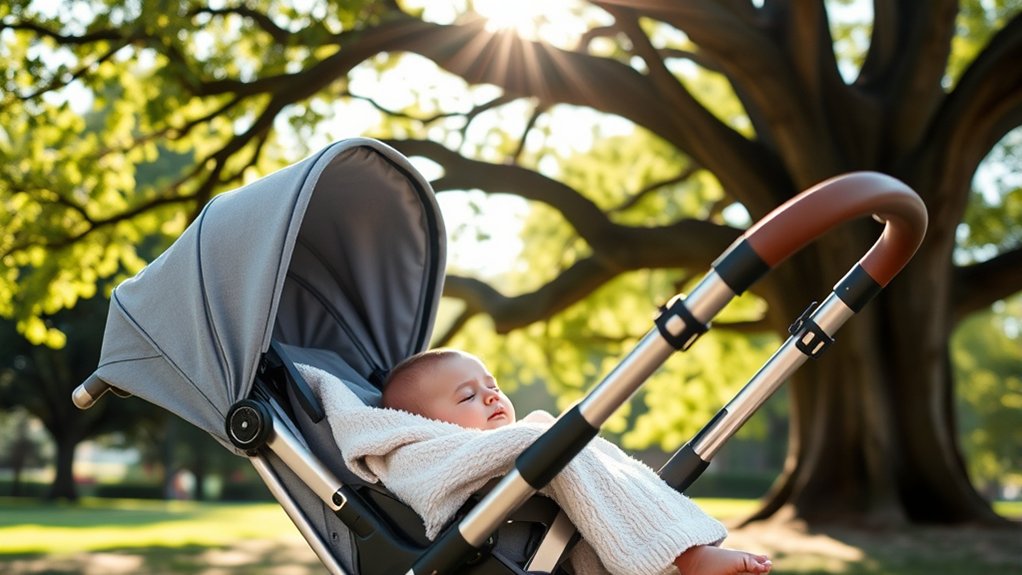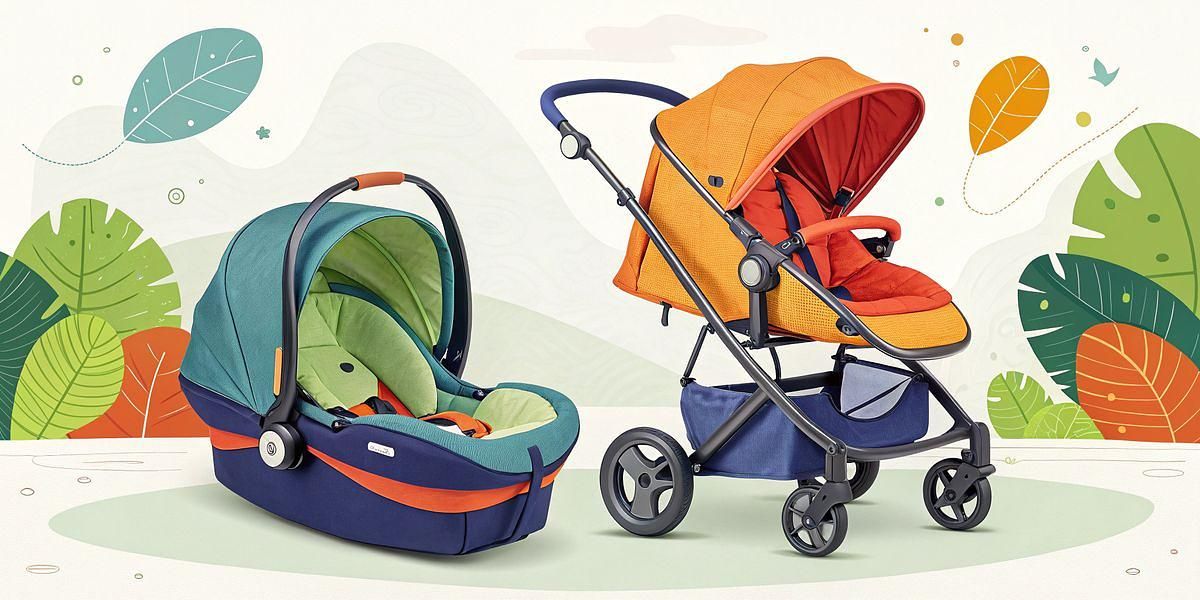Understanding Baby’s Sleep Needs
Understanding your baby’s sleep needs is essential for their development and your peace of mind. Newborns (0–3 months) generally sleep about 14–17 hours per 24 hours, and infants (4–12 months) need 12–16 hours including naps CDC, 2024. As babies often fall asleep during outings, stroller sleeping can be convenient.
However, it’s important to guarantee a safe environment, prioritizing safety by using a flat recline (bassinet-style) for newborns and transferring to a crib or bassinet as soon as feasible. This helps reduce the risk of positional asphyxiation due to poor head control AAP, 2022. For best practices, always place your baby on their back, similar to how you’d position them in a crib CDC, 2024. While strollers can offer a flexible sleeping space during travel, they shouldn’t replace a crib or bassinet. Proper support is critical for their comfort and sleep quality.
Features of Umbrella Strollers for Sleep
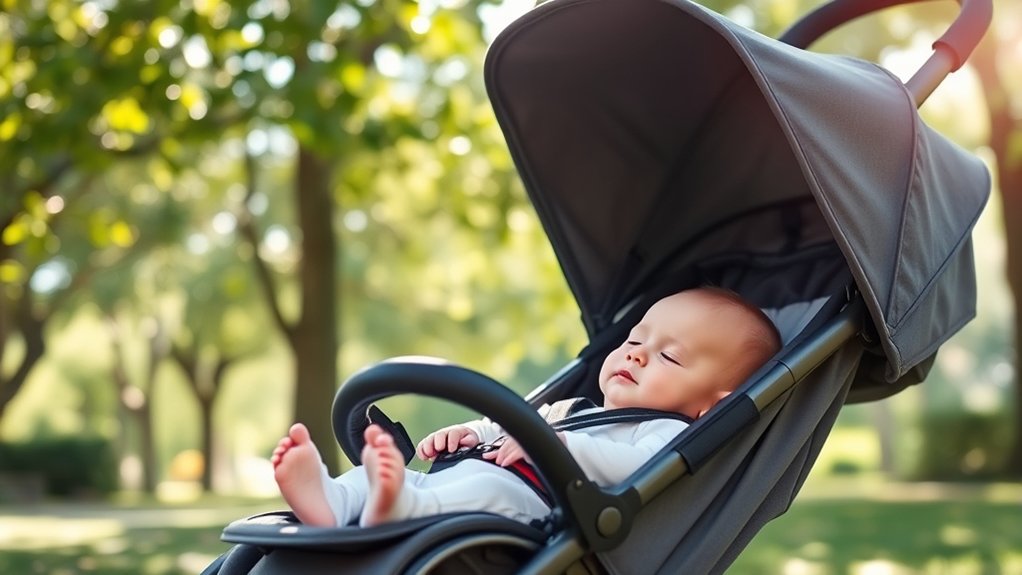
As you consider how best to support your baby’s sleep during outings, exploring the features of umbrella strollers can be quite enlightening. Many umbrella strollers offer a reclining feature for a more comfortable resting position, though not all can fully recline or are approved for use with young infants. Adjustable canopies are a valuable addition, providing shade and blocking light to create a soothing environment. While the lightweight design makes it easy to transport, it’s essential to guarantee your baby naps supervised and to transfer them to a flat, firm sleep surface when possible CDC, 2024. Some models include manufacturer-supplied head supports; avoid aftermarket pillows or padding that weren’t provided with the stroller.
| Feature | Benefit |
|---|---|
| Reclining Feature | Helps baby rest more comfortably (still transfer to flat sleep surface) |
| Adjustable Canopies | Blocks light for better rest |
| Harness (Five-Point) | Reduces fall/injury risk during supervised naps |
| Lightweight Design | Easy transportation for parents |
Safety Considerations for Stroller Naps
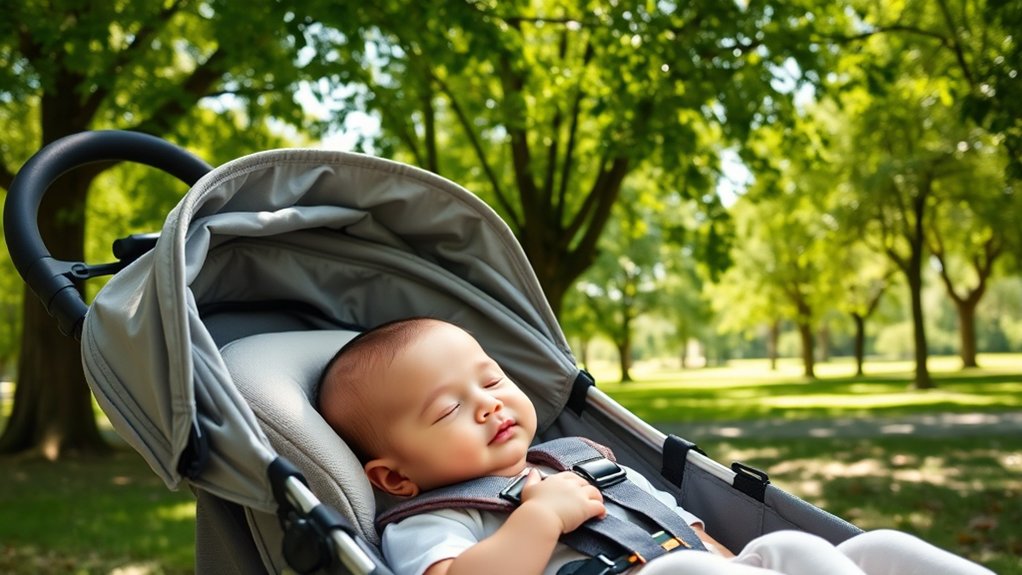
While stroller naps can offer convenience during outings, safeguarding your baby’s safety is essential. For newborns, using a bassinet-style stroller with a flat sleeping surface is important to reduce the risk of positional asphyxiation. If you have an older baby, they may nap in a reclined stroller seat during travel with close supervision, but sitting devices (including strollers) are not recommended for routine sleep—move your baby to a crib or bassinet as soon as feasible AAP, 2022.
Always supervise your baby during stroller naps. Secure them with a five-point harness to prevent falls or injuries AAP/HealthyChildren, last updated Aug 11, 2022; accessed 2025. Creating a calm environment by reducing light and noise can improve the quality of their nap. Remember, for longer, restorative sleep sessions, shift your baby to a crib or bassinet CDC, 2024.
Parent Experiences With Umbrella Stroller Naps

When it comes to umbrella stroller naps, many parents find that their experiences vary widely. You might notice that your baby can easily fall asleep during outings, while others struggle due to the less supportive seating in umbrella strollers.
- Sleeping success: Many babies fall asleep multiple times during outdoor activities. The rhythmic motion of the stroller can be soothing, helping maintain nap routines.
- Challenges: Not every baby adapts well. Some parents observe discomfort, with babies struggling to find a comfortable sleeping position. This often leads to shorter naps.
- Solutions: Adjust the seat recline and harness per the manual. Use only manufacturer-approved support inserts. If needed to prevent slouching in a supervised stroller, you may place rolled-up blankets at the sides, away from the face—an approach noted by AAP’s family site—never near the head/neck and never in a crib or bassinet AAP/HealthyChildren, 2022 (accessed 2025).
Tips for Ensuring a Comfortable Stroller Nap
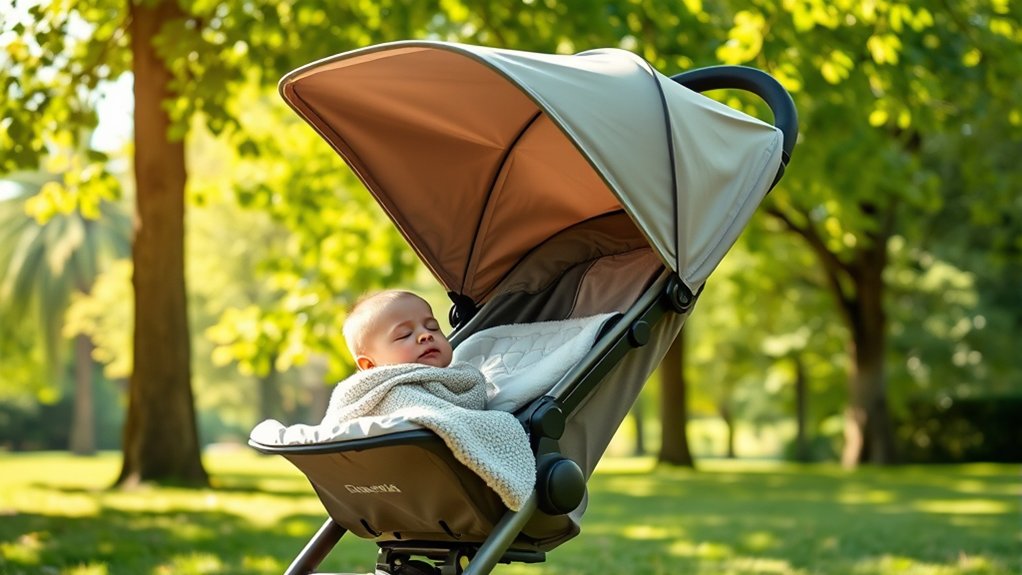
To guarantee a restful stroller nap, select an umbrella stroller with a reclining feature that supports your baby’s posture. Keep a close eye on your baby’s comfort by checking for any signs of discomfort, like slumping or fussiness, and adjust the harness as needed. Maintain airflow by using the stroller’s built-in canopy or breathable sunshades designed for strollers—avoid draping blankets or covers that can trap heat Loma Linda University Health, 2023.
Choose Proper Recline
Selecting the right recline for an umbrella stroller is essential for guaranteeing your baby enjoys a comfortable nap while on the go. Focus on a stroller with a secure, deep recline. For sleep, prioritize a flat (not inclined) surface such as a crib, bassinet, or a stroller-approved bassinet attachment; infant sleep products must not be inclined above 10 degrees under U.S. safety rules CPSC, 2023.
- Recline Feature: Opt for a seat that reclines deeply and locks securely to help prevent slumping.
- Flexibility: A multi-position recline offers flexibility, allowing you to adjust to your baby’s ideal resting position.
- Testing: Always test the recline mechanism to guarantee it locks securely.
Never leave the stroller unattended.
Monitor Baby’s Comfort
Keeping a close eye on your baby’s comfort during stroller naps is vital for their well-being. A relaxed posture and calm expressions usually mean your baby in a stroller is comfortable. If they’re fussy or squirmy, it’s time to adjust.
Make sure the stroller seat’s harness is snug but not too tight, allowing your baby to breathe easily. A seat that reclines is helpful for posture, but for actual sleep, transfer to a crib or bassinet as soon as possible AAP, 2022. Dress your baby appropriately for the weather to avoid overheating or getting too cold CDC, 2024.
Ensure Airflow Maintenance
Maintaining proper airflow is essential for ensuring your baby’s comfort and safety during stroller naps. By focusing on ventilation, you can prevent overheating and promote restful sleep. Here’s how:
- Choose the Right Stroller: Opt for strollers with mesh panels or built-in ventilation features to enhance airflow while shielding your baby from direct sunlight.
- Positioning Matters: Always place the stroller in a shaded area when outdoors and avoid draping blankets that can trap heat and reduce airflow; use the stroller’s canopy or breathable sunshades instead Loma Linda University Health, 2023HeatHealth.info, 2023.
- Utilize Reclining Features: When using an umbrella stroller, select models with a reclining feature. This supports your baby’s posture and helps keep airways clear; still transfer to a flat sleep surface when you can CDC, 2024.
Regularly monitor your baby’s temperature and adjust clothing to suit weather conditions.
Comparing Umbrella Strollers to Other Stroller Types

While choosing the right stroller for your baby, you may find yourself comparing umbrella strollers to other types. Umbrella strollers are lightweight and portable, perfect for quick outings. However, if sleep in a stroller is your top priority, consider that they often lack a full recline and many are not approved for newborns. In contrast, full-size strollers offer more features, like better suspension, making them ideal for uneven surfaces. Travel systems provide versatility, with a car seat or bassinet included, catering to infants’ needs right from birth. Jogging strollers excel in stability and shock absorption, suitable for active parents.
| Stroller Type | Key Features |
|---|---|
| Umbrella Strollers | Lightweight, portable; many lack full recline and may have age minimums |
| Full-Size Strollers | More features, better suspension for uneven surfaces |
| Travel Systems | Includes car seat or bassinet; versatile for infants from birth |
| Jogging Strollers | Stability, shock absorption; not as portable |
| Baby Gear Priority | Consider portability vs. comfort and safety |
Choosing depends on your lifestyle and priorities.
Frequently Asked Questions
Is It Okay to Let Baby Sleep in a Stroller?
Briefly, yes—if you guarantee sleep safety, keep the baby supervised, and transfer to a flat, firm surface on the back as soon as possible. Sitting devices (including strollers) are not recommended for routine sleep, especially for infants under 4 months AAP, 2022CDC, 2024.
Can You Put an Infant in an Umbrella Stroller?
Check the manufacturer’s age/weight rating. Many umbrella strollers are intended for older infants and toddlers; for newborns, use a bassinet attachment or a travel system that keeps the sleep surface flat. Always use the harness and supervise AAP/HealthyChildren, last updated Aug 11, 2022; accessed 2025.
What Is the 3-3-3 Rule for Baby Sleep?
There is no AAP- or CDC-endorsed “3-3-3 rule” for infant sleep. Follow established safe-sleep guidance: back to sleep, firm flat surface, and a clear sleep space CDC, 2024AAP, 2022.
Where Can a Baby Sleep if There Is No Crib?
Use a bassinet or play yard that meets current U.S. safety standards, with a firm, flat mattress and a fitted sheet only. Avoid inclined sleepers and other products not designed for infant sleep CDC, 2024CPSC, 2023.
Conclusion
When considering stroller naps, prioritize reclining features, guarantee a secure harness, and maintain a calm, well-ventilated environment. Choose a stroller that reclines adequately, secures with a five-point harness, and shields from light without restricting airflow. Supervise continuously, monitor your baby’s comfort, and transfer to a crib or bassinet as soon as you can AAP, 2022CDC, 2024. Your baby’s well-being depends on it.
